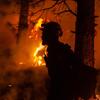July 24, 2023: This photograph shows fluttering Greek and European flags on a burnt building amid a fire between the villages of Kiotari and Genadi, on the Greek island of Rhodes.
Spyros Bakalis/AFP via Getty Images
hide caption
toggle caption
Spyros Bakalis/AFP via Getty Images


July 24, 2023: This photograph shows fluttering Greek and European flags on a burnt building amid a fire between the villages of Kiotari and Genadi, on the Greek island of Rhodes.
Spyros Bakalis/AFP via Getty Images
Relentless wildfires in Greece are forcing tens of thousands of people to evacuate from the islands of Rhodes and Corfu — and leaving many tourists stranded at airports and makeshift shelters.
The country is one of many in Europe that’s been battling a heat wave since mid-July, with temperatures on some islands climbing above 104 degrees Fahrenheit. Scores of wildfires have broken out across Greece in the past week, stoked by dry conditions and possibly arson, as some Corfu officials have claimed.
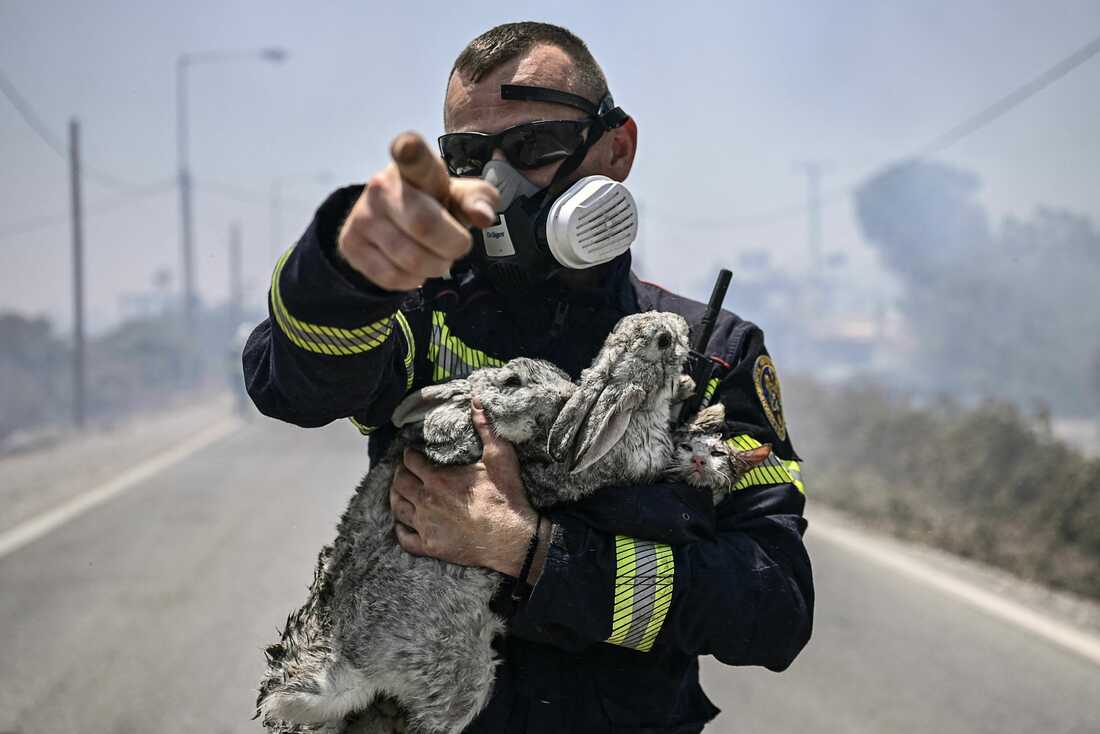

July 24, 2023: A fireman gestures and holds a cat and two rabbits after rescuing them from a fire between the villages of Kiotari and Gennadi, on the Greek island of Rhodes.
Spyros Bakalis/AFP via Getty Images
hide caption
toggle caption
Spyros Bakalis/AFP via Getty Images


July 24, 2023: A fireman gestures and holds a cat and two rabbits after rescuing them from a fire between the villages of Kiotari and Gennadi, on the Greek island of Rhodes.
Spyros Bakalis/AFP via Getty Images
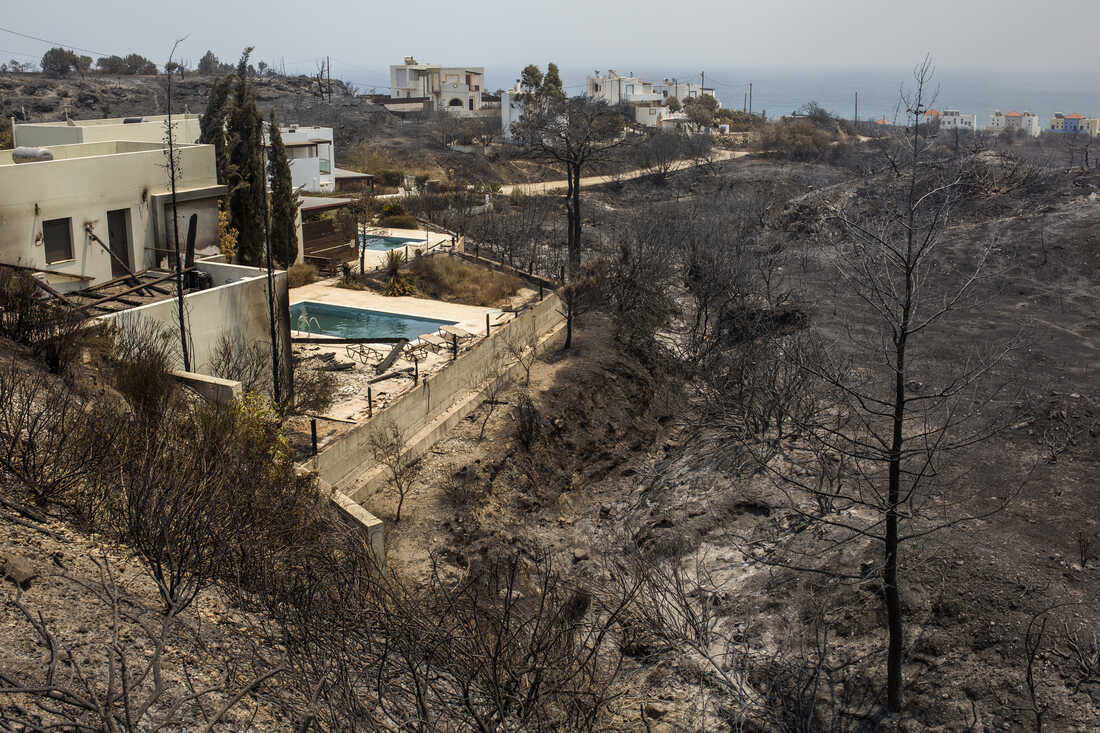

July 24, 2023: Burnt trees are seen next to a hotel near the village of Kiotari. Forest fires rage in Rhodes and other parts of Greece.
Socrates Baltagiannis/Picture Alliance via Getty Images
hide caption
toggle caption
Socrates Baltagiannis/Picture Alliance via Getty Images


July 24, 2023: Burnt trees are seen next to a hotel near the village of Kiotari. Forest fires rage in Rhodes and other parts of Greece.
Socrates Baltagiannis/Picture Alliance via Getty Images
Greek firefighters are still working to contain the blazes, with help from several other countries. But they face an uphill battle, as Greece’s weather service says temperatures are likely to flare up again on Tuesday for several days.
“We are in the seventh day of the fire and it hasn’t been controlled,” Rhodes Deputy Mayor Konstantinos Taraslias told Greek state TV ERT as a fresh round of evacuations were ordered on Monday, Politico reports.
Corfu became the second island to launch major evacuations, after some 19,000 people fled Rhodes over the weekend in what Greek authorities called “the largest evacuation from a wildfire in the country.”


July 23, 2023: Evacuees take shelter at a sports hall in Venetokleio due to wildfires on Rhodes island, Greece.
Damianidis Eleftherios/Anadolu Agency/Getty Images
hide caption
toggle caption
Damianidis Eleftherios/Anadolu Agency/Getty Images


July 23, 2023: Evacuees take shelter at a sports hall in Venetokleio due to wildfires on Rhodes island, Greece.
Damianidis Eleftherios/Anadolu Agency/Getty Images
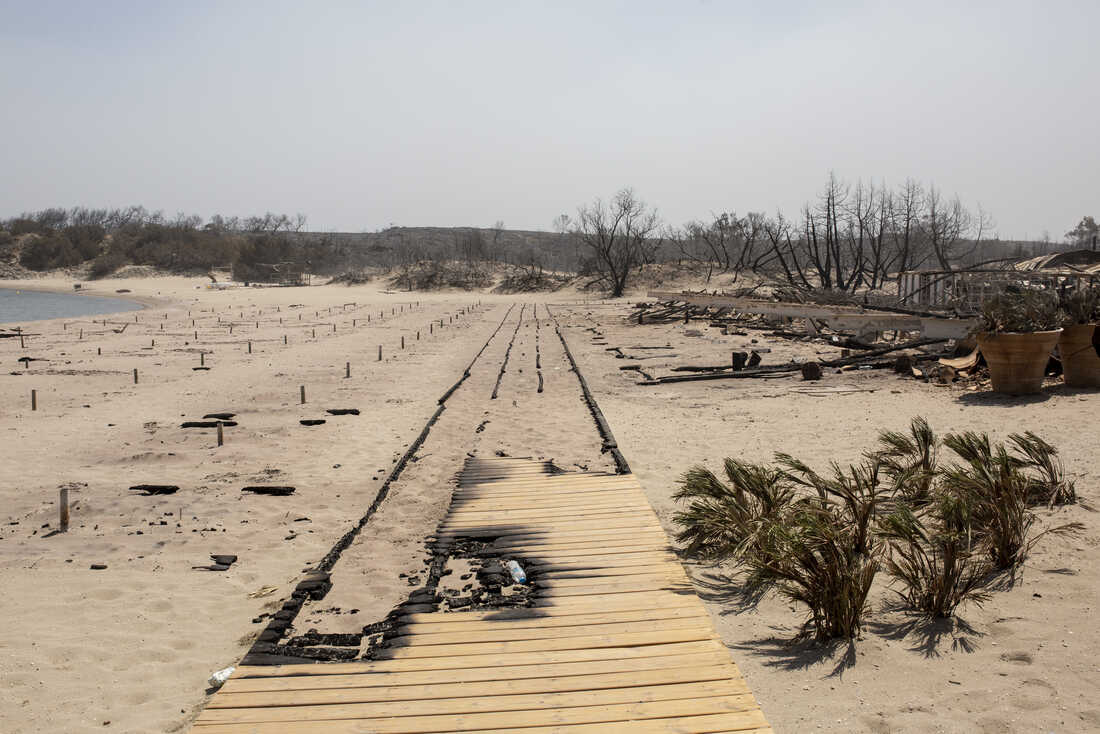

July 24, 2023: A burnt beach bar can be seen near the village of Kiotari. Forest fires rage on Rhodes and in other parts of Greece.
Socrates Baltagiannis/Picture Alliance via Getty Images
hide caption
toggle caption
Socrates Baltagiannis/Picture Alliance via Getty Images


July 24, 2023: A burnt beach bar can be seen near the village of Kiotari. Forest fires rage on Rhodes and in other parts of Greece.
Socrates Baltagiannis/Picture Alliance via Getty Images
Citing local police, The Associated Press reports that 16,000 people were evacuated from Rhodes by land and 3,000 by sea from 12 villages and several hotels. Six people were treated at a hospital for respiratory problems.
Authorities said at least 2,400 visitors and locals were evacuated from Corfu overnight on Sunday as a precaution, according to AFP.


July 23, 2023: People watch the fires near the village of Malona in the Greek island of Rhodes.
Spyros Bakalis/AFP via Getty Images
hide caption
toggle caption
Spyros Bakalis/AFP via Getty Images


July 23, 2023: People watch the fires near the village of Malona in the Greek island of Rhodes.
Spyros Bakalis/AFP via Getty Images
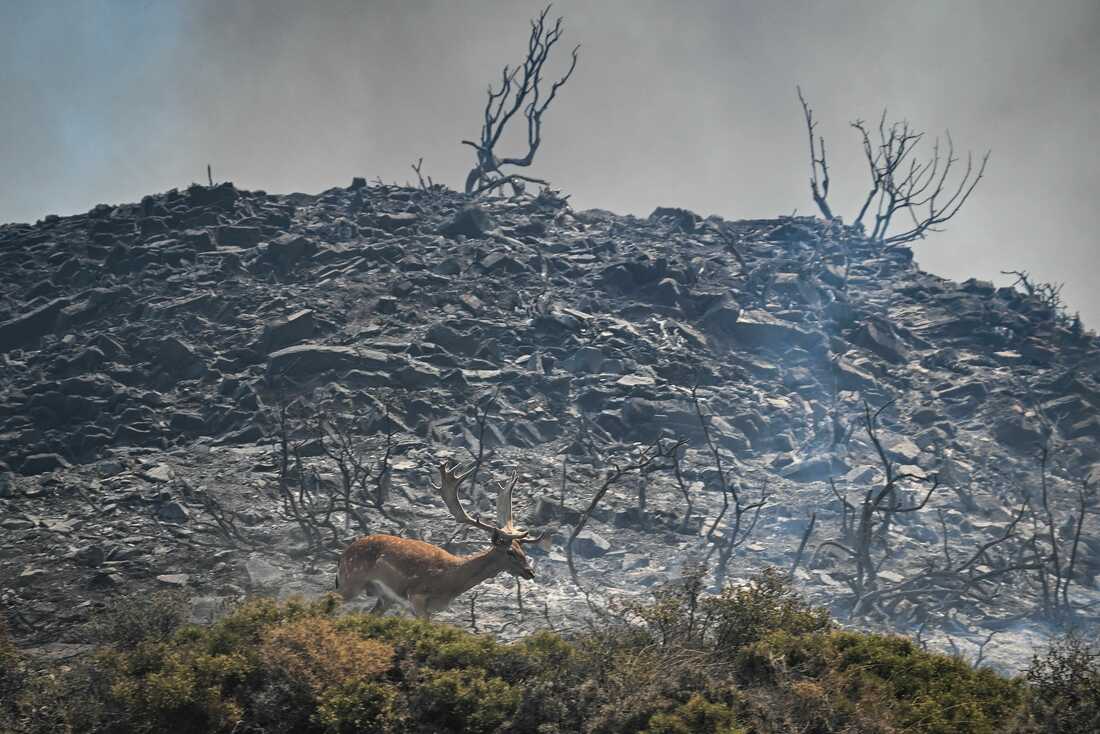

July 24, 2023: A deer runs with smoke in the background during a fire between the villages of Kiotari and Gennadi, on the Greek island of Rhodes.
Spyros Bakalis/AFP via Getty Images
hide caption
toggle caption
Spyros Bakalis/AFP via Getty Images


July 24, 2023: A deer runs with smoke in the background during a fire between the villages of Kiotari and Gennadi, on the Greek island of Rhodes.
Spyros Bakalis/AFP via Getty Images
Financial Times reporter Eleni Varvitsioti told Morning Edition from Athens that Greece is taking more precautionary measures in the wake of the traumatic 2018 Mati fire, which killed more than 100 people and left a lasting mark on the country.
Wildfires have become a nearly annual phenomenon in Greece, exacerbated by climate change.
“It’s something that happens every year, to be honest, but this year it’s simultaneously in so many different fronts,” Varvitsioti said. “And that’s why I think it’s very hard for the Greek fire department to deal with it.”
Tourists are scrambling to get home
The fires struck during peak tourist season in Greece. And while visitors flock to the islands from all over the world, Corfu and Rhodes are especially popular with people from the United Kingdom.


July 23, 2023: Tourists wait in the airport’s departure hall as evacuations are underway due to wildfires, on the Greek island of Rhodes.
Will Vassilopoulos/AFP via Getty Images
hide caption
toggle caption
Will Vassilopoulos/AFP via Getty Images


July 23, 2023: Tourists wait in the airport’s departure hall as evacuations are underway due to wildfires, on the Greek island of Rhodes.
Will Vassilopoulos/AFP via Getty Images
There are currently between 7,000 and 10,000 British tourists on Rhodes, U.K. Foreign Office Minister Andrew Mitchell said on Monday.
Many of them are still trying to get out of the country, both in terms of getting to the airport and getting a flight home.
Some tourists say they had to walk for miles in the heat to reach safety, and local TV footage shows crowds of people walking beneath orange, smoke-filled skies and lying on mattresses in makeshift shelters.
Varvitsioti said tourists were moved to locations like schools and conference centers until they could fly out, which has also been a complicated endeavor. Many have spent one or even two nights sleeping in the hallways of Rhodes’ international airport.


July 22, 2023: Smoke caused by a massive wildfire in the Rhodes island in Greece.
Argiris Mantikos/Xinhua News Agency/Getty Images
hide caption
toggle caption
Argiris Mantikos/Xinhua News Agency/Getty Images


July 22, 2023: Smoke caused by a massive wildfire in the Rhodes island in Greece.
Argiris Mantikos/Xinhua News Agency/Getty Images
“Some of them did not even have their travel documents so there was a makeshift operation at the airport by the foreign ministry and embassies which provided travelers with the necessary documents so they could return home,” she explained.
The British government said Sunday it had sent a rapid deployment team to Rhodes to support its citizens at the airport, by helping with emergency travel documents and working with travel operators and Greek authorities. Greece’s foreign ministry has also set up a crisis management unit to facilitate the evacuation of foreign citizens.
British airlines-slash-tour-operators, Jet2 and Tui, have canceled all incoming flights to Rhodes for the next several days and are using the empty planes to bring tourists home.
Greece’s transportation ministry said 21 repatriation flights took place on Monday and more would follow.
The U.K. Foreign Ministry updated its travel advisory for Greece on Sunday, telling travelers headed for any affected areas to check with their travel operator or hotel first — but not warning against it.
Mitchell, the Foreign Office minister, told Times Radio that that’s because only 10% of Rhodes is affected by the fires.
He said he personally would not travel there at the moment, but deferred to “tourist companies and the holiday experts … to give guidance on whether or not a family or individuals’ holidays are going to be ruined by these events.”
Meanwhile, U.S. officials are urging any Americans in the area to “follow instructions from local authorities and closely monitor the local media and emergency alerts.”
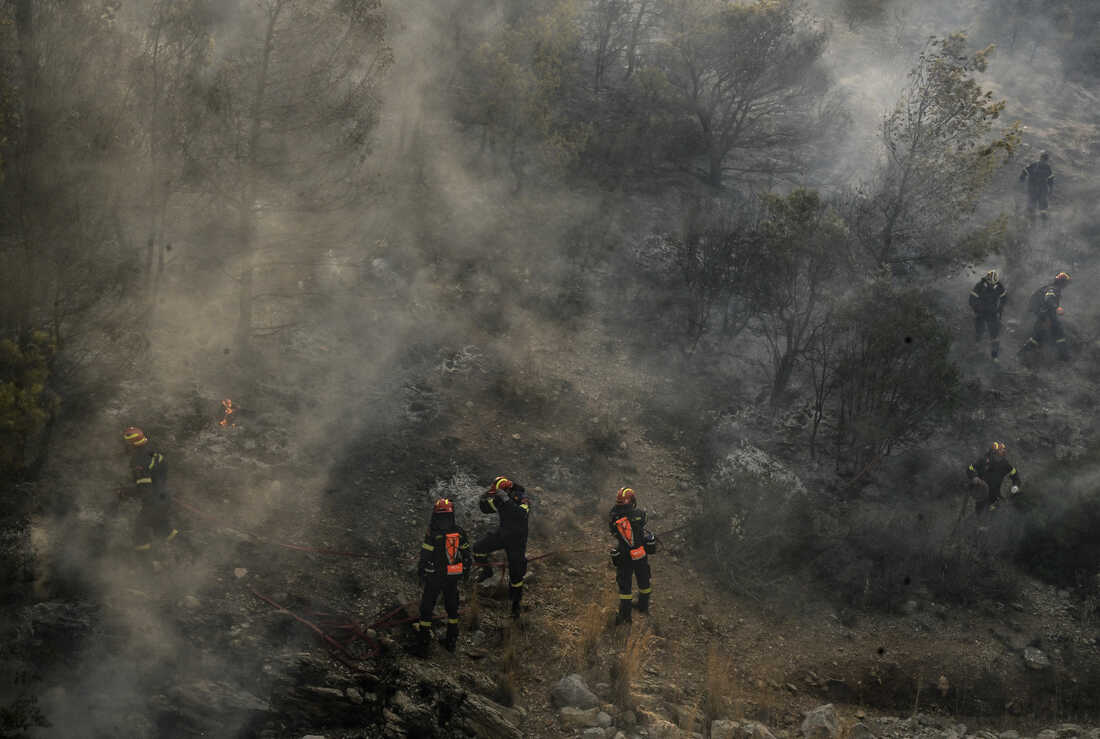

July 19, 2023: Firefighters work to extinguish a wildfire in a forest near Nea Peramos, west of Athens.
Louisa Gouliamaki/AFP via Getty Images
hide caption
toggle caption
Louisa Gouliamaki/AFP via Getty Images


July 19, 2023: Firefighters work to extinguish a wildfire in a forest near Nea Peramos, west of Athens.
Louisa Gouliamaki/AFP via Getty Images
Putting out the fires is a group effort
Crews are working to contain major blazes, not just on those islands but on Evia and the Peloponnesian peninsula as well.
They’re getting help from the European Union and beyond.
Prime Minister Kyriakos Mitsotakis said on Twitter that Greece has gotten three firefighting helicopters from Egypt, two planes and a helicopter from Turkey, four helicopters from Jordan, and two air tractors from Israel.
France, Italy, Romania, Slovakia, Poland, Croatia, Bulgaria and Malta are among the countries deploying not only equipment but hundreds of firefighters, collectively.
Ursula von der Leyen, the president of the European Commission, tweeted on Sunday that EU firefighters were already on the ground.
“Greece is handling this difficult situation with professionalism, putting emphasis on safely evacuating thousands of tourists, and can always count on European solidarity,” she wrote.
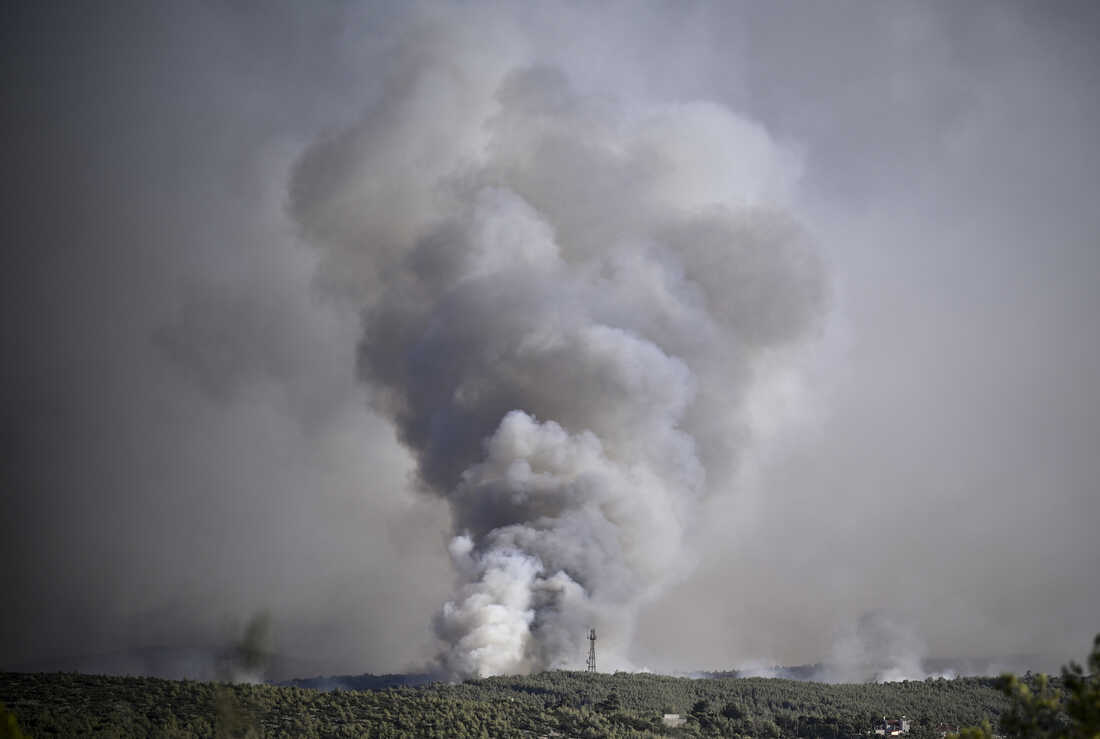

July 19, 2023: A cloud of smoke rises during a fire in Dervenochoria, north-west of Athens.
Spyros Bakalis/AFP via Getty Images
hide caption
toggle caption
Spyros Bakalis/AFP via Getty Images


July 19, 2023: A cloud of smoke rises during a fire in Dervenochoria, north-west of Athens.
Spyros Bakalis/AFP via Getty Images
Mitsotakis told parliament on Monday that “we are at war — completely focused on the fires,” per the AP.
He said climate change “will make its presence ever more felt with greater natural disasters throughout the Mediterranean region,” and urged people to remain “on constant alert” in the days and weeks ahead.
This story originally appeared on NPR







